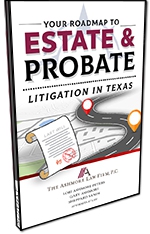 People have a variety of reasons for not having a will. Some people just never get around to it. Others can’t make a decision about who to include in their will or think it’s obvious who should inherit their assets. Many people simply don’t think they need one. However, the reality is that if you die without a will and leave behind minor children or a dependent, investments (stocks, bonds, investment accounts) life insurance, retirement accounts, real estate (homes, vacation properties, rental properties) business interests, and bank accounts, the state will have to step in and decide who gets what. These decisions are made based on Texas intestacy laws.
People have a variety of reasons for not having a will. Some people just never get around to it. Others can’t make a decision about who to include in their will or think it’s obvious who should inherit their assets. Many people simply don’t think they need one. However, the reality is that if you die without a will and leave behind minor children or a dependent, investments (stocks, bonds, investment accounts) life insurance, retirement accounts, real estate (homes, vacation properties, rental properties) business interests, and bank accounts, the state will have to step in and decide who gets what. These decisions are made based on Texas intestacy laws.
Texas Intestacy Laws Follow Rigid Guidelines
In general, inheritance laws in Texas give priority to your closest family members. This makes sense, but not everyone would want to leave their possessions to close relatives. This is the problem with dying intestate—meaning without a will. The law gives you the right to leave your property to anyone you choose. Your heirs do not have to be relatives, and they do not have to live in Texas. No one else has to approve of your decisions. However, you can only exercise this right through a legally executed will.
If you die without a will, the state will distribute your assets in the following order:
Surviving spouse
If you die without a will and your spouse survives you, he or she will inherit all of your share in the marriage’s community property. Your separate or personal property will be divided between your spouse and children if you have children or your spouse and parents or siblings if you don’t have children. Your spouse will inherit according to these rules even if you were separated or estranged, but not if you were divorced. If you have a blended family, your spouse will be sharing assets with your biological children if you have not specified your wishes in a will.
Children
If your spouse does not survive you or you were divorced, your children will each receive an equal share of your estate. If a child dies before you and leaves grandchildren, those descendants would split their parent’s share. The state will not consider factors such as the closeness of your relationships with each child, which child might have cared for you when you needed help, or whether you were estranged from any of your children or grandchildren.
Parents
Dying without a surviving spouse or children means your parents, if they are still alive, would each get half of your property. If only one parent outlives you and you have no siblings, that parent would inherit the whole estate.
Siblings
If you do have siblings who survive you, the surviving parent would get half of the estate, and the siblings—or their children if they are deceased—would split the other half. If you only have siblings at the time of your death, they or their children would share the estate equally.
Relatives
In the absence of a spouse, children, grandchildren, parents, siblings, nieces, or nephews, your estate would be split equally between relatives on your mother’s side and relatives on your father’s side, if they can be located
The State of Texas
If heirs cannot be located, the estate will pass on to the State of Texas.
While this order of succession makes sense from a legal standpoint, it is rarely how individuals would choose to distribute their assets. Do you have a significant other you would like to support? Do you want your children to each get an equal share? Would you want a niece to get money over a close friend? Do you have pets that should be cared for by a specific person? None of these preferences will be honored by a court unless they are outlined in a legal will.
Don’t Have a Will? What to Do Now
As you can see, dying without a will can create a complicated situation and leave the people you love feeling forgotten and hurt. With a will, you could make sure your items and assets go to the people you designate. For example, you could leave a sentimental treasure to a friend who would appreciate it; you could repay an adult child who took you into their home when you were ill; you could leave the family home to someone who would live in it and care for it, rather than having it sold and the proceeds shared equally among your legal heirs. You can also include in your estate plan provisions for your pet's care after your passing. On average, 5-7 million pets end up in shelters due to the passing of their owners. We are here to help you with a specialized estate plan for your specific needs, wants, and wishes. Get started by meeting with an estate planning attorney today.
Do You Need To Speak With An Experienced Estate Planning Lawyer In The Dallas Area?
If you need to speak to an experienced estate planning attorney please contact us online or call our Dallas office directly at 214.559.7202. We help clients throughout the Dallas area with all of their estate planning needs and look forward to helping you.


